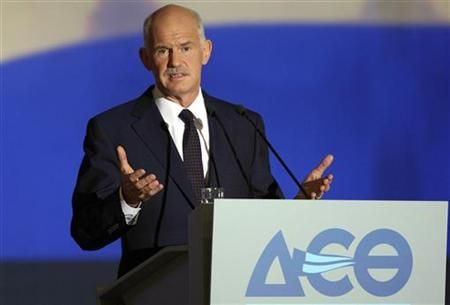Greece to Front-Load Austerity, Troika to Return

Greece pledged to bring forward painful austerity measures on Tuesday, convincing international lenders to return to Athens early next week for talks that it hopes will secure the aid it needs to avert bankruptcy.
After a two-hour phone call with senior officials from the troika of EU and IMF emergency lenders, Finance Minister Evangelos Venizelos was set to present his proposals to the Greek cabinet on Wednesday.
Having consistently watched Greece miss its targets, the International Monetary Fund and European Union made clear last week that their patience was running thin, and warned Athens to stop dithering or risk seeing its 110 billion euro ($150 billion) loan deal cut off.
A Finance Ministry official said Greece had agreed to bring forward measures from the so-called mid-term plan in which it has committed to slash its budget deficit through 2014 and sell some 50 billion euros in state assets.
Some measures will be brought forward. The main targets (deficit and debt) will not change, a ministry official said after the teleconference, on condition of anonymity.
The ministry said the call -- the second in two days -- had made satisfactory progress and teams of experts would push on with finalizing the 2011 budget and working through a fiscal plan to 2014.
The IMF/EU mission's plan to return to Athens closes a tense chapter from earlier this month when inspectors abruptly left Greece in a disagreement over the extent of its budget slippage and what Athens needed do to make good on its pledges.
The talks will continue this coming weekend in Washington DC, where Mr. Venizelos is going to attend the annual meeting of the International Monetary Fund, the Finance Ministry said.
The ministry official said he was personally confident Greece would clinch the release of the 8 billion euro ($11 billion) aid tranche that it needs by next month to avoid running out of cash.
MORE PAIN
Greece is heading into a fourth year of recession, youth unemployment is 40 percent and the economy is staggering under a debt expected to exceed 165 percent of annual output this year.
Anger among Greece's 10 million people is high, but so is the bailout fatigue among north European creditor countries, especially Germany, Finland and the Netherlands, which are taking the toughest line on strict conditions for more money.
Public protests against the cuts have dwindled since early this year, when police fought rioters on the streets of Athens, but frustration is growing again as the crisis worsens.
They have crippled us, said 44-year-old public sector employee Niki Playannakou, a single mother.
We accepted the cuts last year, we put up with some things for the sake of the country. But as time goes by we don't see things improving. How much can a family take?
The IMF has told Athens to cut the public workforce and payroll, shut inefficient state entities, fight tax evasion and sell billions of euros of state property to plug the budget gap
The government has already introduced painful new taxes on wages and property and cut public sector pay and pensions, but until Tuesday had baulked at sacking more civil servants, a key component of the governing Socialist party's electorate.
Some economists say that, because the euro zone has not yet approved the EFSF stabilization fund meant to protect its weaker members, the risk of letting Athens default and perhaps trigger a messy breakup of the zone may be too great for its lenders to deny it one more dose of aid.
One barometer, CDS default insurance contracts, suggests investors see the probability of a Greek default at more than 90 percent, according to Reuters calculations on data from Markit.
That could include a technical default engineered under a bond-swap plan meant to offer Greece some relief from its debt load, which looks set to exceed 165 percent of GDP this year.
According to an official from the body that would decide whether a 'credit event' had occurred, neither that plan nor an inability of Athens to pay state workers next month should trigger a payout on CDS contracts in the near term, an event that could cause wider market ripples.
(Additional reporting by George Georgiopoulos and Angeliki Koutantou; Writing by Michael Winfrey; Editing by Kevin Liffey)
© Copyright Thomson Reuters 2024. All rights reserved.





















